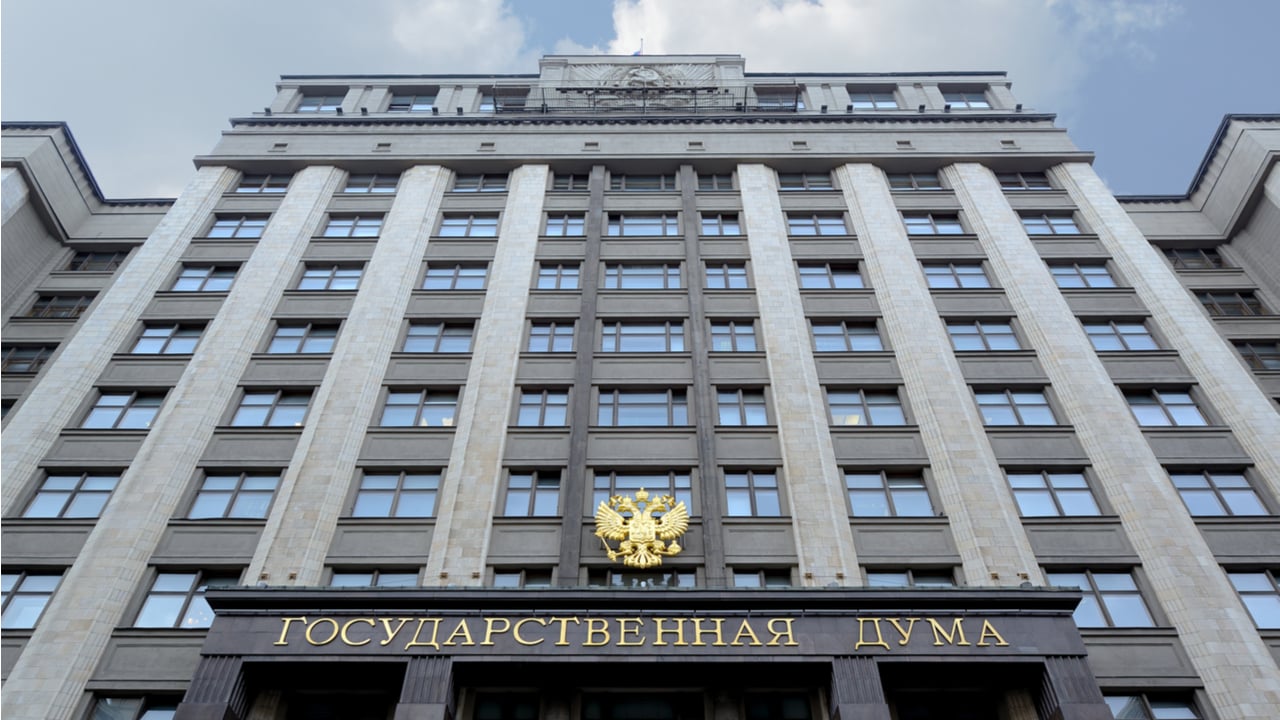 Cryptocurrency mining should be allowed in areas with excess energy and prohibited in those that experience deficits, according to Russian officials preparing to legalize it. An expert from the crypto industry has recently marked the regions where Moscow is likely to authorize mining and the ones where it will probably ban the extraction of digital […]
Cryptocurrency mining should be allowed in areas with excess energy and prohibited in those that experience deficits, according to Russian officials preparing to legalize it. An expert from the crypto industry has recently marked the regions where Moscow is likely to authorize mining and the ones where it will probably ban the extraction of digital […] The internet hosting and software development subsidiary of Microsoft, Github, has partially unbanned the Tornado Cash repositories following the recent sanctions enforced by the U.S. Treasury Department’s Office of Foreign Asset Control (OFAC). Github’s decision follows the U.S. Treasury updating the public, noting that U.S. persons can copy, view, and discuss the open-source code. Github’s […]
The internet hosting and software development subsidiary of Microsoft, Github, has partially unbanned the Tornado Cash repositories following the recent sanctions enforced by the U.S. Treasury Department’s Office of Foreign Asset Control (OFAC). Github’s decision follows the U.S. Treasury updating the public, noting that U.S. persons can copy, view, and discuss the open-source code. Github’s […]
The Chinese crypto miner maker Canaan has been expanding its mining business, accumulating a total of 346.84 BTC by the end of June.
Major Chinese cryptocurrency miner manufacturer Canaan appears to have no issues with the local ban on crypto, as the company’s overall performance has continued to grow in 2022.
Canaan officially announced financial results for the second quarter of 2022 on Thursday, reporting a 117% increase in gross profit from the same period of 2021. According to the firm, the Q2 profits amounted to 930 million renminbi (RMB), or nearly $139 million.
The company’s Q2 net income was 608 million RMB, or $91 million, or a 149% increase from 425 million RMB in the same period last year. Canaan noted that foreign currency translation adjustment in Q2 was an income compared to previous losses due to the U.S. dollar appreciation against RMB during Q2.
Despite posting significant profits, Canaan has found the second quarter a challenging period due to Bitcoin (BTC) plummeting below $20,000 in June, the company's CEO Nangeng Zhang said.
“The COVID-19 containment lockdown in key cities in China also brought severe disruptions to our daily operations and demand for our AI chips,” he noted.
Zhang mentioned that Canaan has been expanding its global presence, particularly establishing international headquarters in Singapore. The firm has also been working to scale its mining business, generating more BTC with an improved power supply. As of late June, Canaan held a total of 346.84 BTC, or $8.1 million, the CEO said, adding:
“We are fully aware of the downward pressure from the Bitcoin price since the last fourth quarter and expect it to bring prolonged headwinds to our performance in the coming quarters. Nevertheless, we believe in the unique value of Bitcoin and its long-term prospects.”
Canaan’s chief financial officer James Jin Cheng echoed the CEO’s remarks, stating that the company expects a tougher market environment from the lower Bitcoin price level as well as increased energy price and various pandemic and geopolitical uncertainties. He stated:
“As the Bitcoin price further decreased in the second quarter, we responsively lowered our product price for spot sales to shoulder the pressure with our clients. [...] We expect the gross margin to decrease dramatically in the second half of this year.”
The ongoing cryptocurrency winter is not the only concern of crypto mining companies in China though. As previously reported, China announced a blanket ban on all crypto operations — including mining and trading — in September 2021, pushing many firms to force global expansion and escape to other countries. Prior to the ban, China was taking down multiple crypto mining farms in a move to save energy and curb crypto operations in the country.
Related: Bitcoin mining revenue jumps 68.6% from the lowest-earning day of 2022
Apparently, the “great Chinese crypto ban” has not affected local crypto enthusiasts and firms too much so far as China reemerged as the second-largest Bitcoin mining country by January 2022. According to data from the Cambridge Bitcoin Electricity Consumption Index, China still hosts 21% of the total global Bitcoin hash rate, following only the United States, which produces 38%.

The email marketing service provider temporarily suspended crypto-related accounts due to alleged terms of service violations.
The email marketing platform Mailchimp appears to have suspended its services to crypto content creators. Platforms associated with crypto news, content, or related-services started to have issues logging into accounts, followed by notices of service interruptions which began surfacing this week.
Crypto-associated accounts such as the Edge wallet, a provider of self-custody crypto holding services, and Messari, a crypto research company, were among some of the affected.
Early this morning, Sam Richards, at the Ethereum Foundation Tweeted that the Ethereum Foundation Ecosystem Support Program is likewise facing suspension.
Add @Ethereum Foundation's @EF_ESP to the list of customers @Mailchimp has rugged.
— samrichards.eth (@samonchain) August 12, 2022
Anyone have good recommendations for email subscription services with solid API integrations? Or any that don't pull the plug on paying customers without any notification or justification? https://t.co/Cjg2kkqwoT
Cory Klippsten of Swan Private, a Bitcoin investment advisory firm for corporations and high net worth individuals, also Tweeted about the incident. Klippensten called to other marketing agencies in the industry to “step up” in light of this incident and others.
After Hubspot, Klaviyo, Twilio, and Mailchimp all getting taken bc of their crypto clients, it's time for the entire marketing communications / CRM software industry to step up their security BIG time.
— Cory Klippsten (@coryklippsten) August 12, 2022
And yes, we've been taking additional measures. See @skwp thread above.
Indeed Mailchimp, the service previously used for the Cointelegraph newsletter, sent Cointelegraph a notice of service interruption this past Monday as well.

Though mailchimp responded in the time since Cointelegraph’s inquiry, no direct answer to our questions were provided. It later became clear that accounts were being disabled or “temporarily suspended” due to service violation. According to the Mailchimp website the clause falls under the “Acceptable Use” policy in which it outlines prohibited content.
In this section it states, “cryptocurrencies, virtual currencies, and any digital assets related to an Initial Coin Offering” are prohibited due to “higher-than-average abuse complaints”. The site policy claims to have been updated in May of last year.
Last year the emailing marketing service provider was acquired by financial services giant Intuit.
Instances of service disruptions or suspensions are surfacing again this week, though this is not the first time Mailchimp went after crypto-releated content. This type of behavior can be traced back to 2018.
It was in 2018 when Facebook also banned any cryptocurrency-related advertisement on its site due to breeches in the regulatory guidelines.
Related: Haters to unite at the first conference for crypto skeptics
However, at that time the company made a public announcement that “cryptocurrency-related information isn’t necessarily prohibited” and can be distributed so long as the sender isn’t involved in, “the production, sale, exchange, storage, or marketing of cryptocurrencies.” There has yet to be an official statement from Mailchimp regarding the recent developments.
What was released on Wednesday, however, was a message from former CEO and co-founder of Mailchimp Ben Chestnut. He announced that he is formally stepping down from the role after 21 years. In his place Mailchimp will be led by Rania Succar, formerly in charge of the QuickBooks Money team, also a part of Intuit.

TORN is near a historically strong support range, eyeing a 75% rebound by September 2022.
Tornado Cash (TORN) has lost almost half its market valuation two days after being slapped with sanctions by the U.S. Treasury Department.
The department accused Tornado Cash, a crypto mixer platform, of laundering more than $7 billion in cryptocurrencies, including a stash of $455 million allegedly stolen by North Korea-based hackers.
Immediate reactions were followed by U.S.-based crypto companies, including Circle and Coinbase. In a controversial move, the popular crypto firms blocked the movements of their jointly-issued stablecoin USDC tied to Tornado Cash's blacklisted smart contracts.
The news prompted traders to limit their exposure to TORN, Tornado Cash's native token.
On the daily chart, TORN's price has slipped by approximately 45% since the Justice Department's notice about Tornado Cash, to reach $18.50 on Aug. 10. By contrast, the valuation of all the crypto assets had plunged merely 6% in the same timeframe.

Interestingly, TORN's selloff accompanied a spike in daily trading volumes, suggesting momentume.
The downside move has pushed TORN price near a critical technical support.
Related: Anonymous user sends ETH from Tornado Cash to prominent figures following sanctions
TORN has been testing its $15-$18 range for a potential rebound due to its historical relevance as support. Notably, in January and June earlier this year, this level served as a springboard for TORN price to jump 275% and 100%, respectively.

Therefore, a potential rebound move from the range could have TORN tes $32.50 as its next upside target, which coincides with the 0.236 Fib line as shown above. In other words, a 75% recovery by September 2022
On the other hand, a breakdown below the support range sends TORN's price to new record lows.
The views and opinions expressed here are solely those of the author and do not necessarily reflect the views of Cointelegraph.com. Every investment and trading move involves risk, you should conduct your own research when making a decision.
 The government of Kosovo has adopted measures tailored to maintain energy supply in the coming months, including a ban on cryptocurrency mining. The move comes amid a sharp increase in import prices and the restrictions can be extended for up to six months. Authorities in Kosovo Reinstate Ban on Cryptocurrency Mining The executive power in […]
The government of Kosovo has adopted measures tailored to maintain energy supply in the coming months, including a ban on cryptocurrency mining. The move comes amid a sharp increase in import prices and the restrictions can be extended for up to six months. Authorities in Kosovo Reinstate Ban on Cryptocurrency Mining The executive power in […] New legislation introducing tighter restrictions on payments with large sums of cash will enter into force in Israel on Monday. The goal, as stated by the country’s tax authority, is to improve the fight against organized crime, money laundering, and tax evasion. Critics doubt the law will achieve that. Authorities in Israel Go After Cash […]
New legislation introducing tighter restrictions on payments with large sums of cash will enter into force in Israel on Monday. The goal, as stated by the country’s tax authority, is to improve the fight against organized crime, money laundering, and tax evasion. Critics doubt the law will achieve that. Authorities in Israel Go After Cash […] China’s Tencent Holdings plans to shut down its non-fungible token (NFT) platform Huanhe only a year after its launch. The social media giant has reportedly made the decision because of the strict ban on the resale of NFTs imposed by the authorities in Beijing. Huanhe to Close Down a Year After Launch as China Curbs […]
China’s Tencent Holdings plans to shut down its non-fungible token (NFT) platform Huanhe only a year after its launch. The social media giant has reportedly made the decision because of the strict ban on the resale of NFTs imposed by the authorities in Beijing. Huanhe to Close Down a Year After Launch as China Curbs […] President Vladimir Putin of Russia has signed into law a bill banning payments with digital financial assets. The legislation obliges exchange operators to refuse to process transactions facilitating the use of DFAs, a legal category currently covering cryptocurrencies, as “monetary surrogates.” President Putin Approves Legislation Banning Digital Asset Payments in Russian Federation Russian President Vladimir […]
President Vladimir Putin of Russia has signed into law a bill banning payments with digital financial assets. The legislation obliges exchange operators to refuse to process transactions facilitating the use of DFAs, a legal category currently covering cryptocurrencies, as “monetary surrogates.” President Putin Approves Legislation Banning Digital Asset Payments in Russian Federation Russian President Vladimir […] The lower house of Russian parliament has adopted a law prohibiting the use of digital financial assets in payments. To implement the restriction, exchange operators have been obliged to reject transactions which make it possible to employ these assets as a means of payment. Russian Parliament Approves Legislation Preventing Digital Financial Asset Payments The majority […]
The lower house of Russian parliament has adopted a law prohibiting the use of digital financial assets in payments. To implement the restriction, exchange operators have been obliged to reject transactions which make it possible to employ these assets as a means of payment. Russian Parliament Approves Legislation Preventing Digital Financial Asset Payments The majority […]